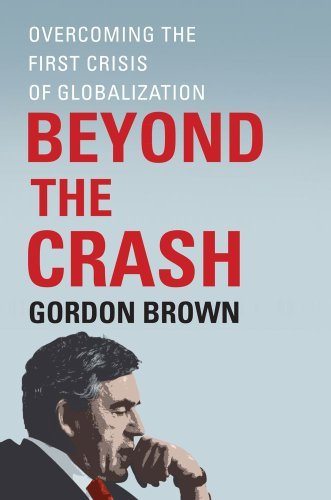 Today’s Guardian calls it his first interview since leaving office, although I think the Independent beat them to that one back in July. But, in any case, Gordon Brown’s chat with Larry
Elliot is another staging post on his slow path back to public life. Here’s my quick summary:
Today’s Guardian calls it his first interview since leaving office, although I think the Independent beat them to that one back in July. But, in any case, Gordon Brown’s chat with Larry
Elliot is another staging post on his slow path back to public life. Here’s my quick summary:
1) Sniping from the moral high ground. A bit late now, but Brown is making a desperate scramble for the moral high ground. Not for him, he says, scurrilous memoirs that sift through the
“arguments” of the past. No, he’s got far more important things on his mind than muck-raking and innuendo, like the future of financial regulation across the world. Or has he? It’s hard
not to see barbs mixed in amongst it all. Take this line from the interview: “I am a full-time MP, not a businessman.” Or this: “Other prime ministers leave office and stay in London
… I have come back with my whole family to Fife.” I wonder whether he has anyone particular in mind when he draws these contrasts.
2) Big words for big times. With Brown’s analysis of the financial crisis out on Tuesday (the perfect Christmas present for all your friends and relatives), he spends some time
talking about its themes. There’s not much to get stuck into, especially as we’ve heard a lot of it – the generalities about “international cooperation” and “the global
economy” – before now. But it’s still striking how far Brown sees this as a defining moment. In his words, “we are witnessing the biggest shift in economic activity in our history.
It is bigger than the Industrial Revolution.”
3) The Great Invictus Mystery. Petty, I know, but I did enjoy this passage from the interview:
Thing is, he told the News of the World in January (£) that he watched Invictus last Christmas, a couple of months before it was released in UK cinemas. He could have seen it again later, in a Scottish cinema, I suppose – but, then, he does have form when it comes to misrepresenting the truth.“‘Over there is a new eight-screen multiplex cinema I opened,’ he says, pointing across the countryside. ‘Really. Do you go there?’ ‘Yes, we do.’ ‘So what was the last film you saw there?’ Long pause in which Brown struggles to think of a film he might have seen in the past year. ‘The one about Mandela,’ he says at last. ‘Invictus’.”
4) Labour now. An indeterminate passage on what Brown thinks of his successor:
Ed Miliband might have expected more, especially given the compliments he has paid Brown since May. Or perhaps our former PM is reluctant to fuel the “Son of Brown” theme.“Can Labour exploit [current political opportunities]? ‘Of course. Ed Miliband is a great guy.’ But is he surprised that it is Miliband rather than Ed Balls, his other long-standing adviser, who succeeded him as Labour leader? ‘I knew that you were going to ask me that and I am not going to answer,’ he says.”
5) Failure and fallibility. The interview ends on a wistful note, with Brown sighing “it seems that way,” when presented with Enoch Powell’s dictum about all political careers ending in failure. And failure comes up elsewhere too, particularly where Brown discusses the regulatory system he constructed. “A shadow banking system had arisen and the regulatory system did not pick that up,” he says. A caveat follows swiftly enough, but there is still a drop more contrition in this interview than we have been used to.






Comments